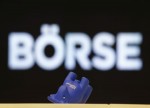
- All Instrument Types
- Indices
- Equities
- ETFs
- Funds
- Commodities
- Currencies
- Crypto
- Bonds
- Certificates
Please try another search

The UKIP leader may have called the EU elections an “earthquake”, after his party won the largest share of the British vote, the first time a party other than Labour or the Conservatives have done so since 1906. However, there were no aftershocks for financial markets.
Although there were some high profile losses for mainstream parties in the UK, Greece, France and Denmark, the markets seem to be cherry-picking the news they want to hear. Markets may, in fact, be cheered by the failed threat from Geert Wilders’ far right party in Holland, and the failure of the once mighty Five Star Alliance, an anti-EU party, which capitulated against the Italian Prime Minister’s Democratic Party who won an impressive 33% of all votes in a record high turnout.
Always look on the bright side of life…
Thus, the status quo prevails in Europe, although the chorus of protest is growing louder, it is still a small force in the European Parliament. From a market perspective, we have imaged three ways of looking at the outcome elections 2014:
- Nothing has changed, so stocks can continue to drift higher, any “shock” outcomes, like the overwhelming win for Italy’s PM Renzi, is good news for markets.
- The increase in the protest vote could be a good thing for the markets, as it could stream line the EU. The amount of red tape created by the EU can be negative for businesses, and thus markets, so anything that could reduce this influence is a good thing.
- The markets can only think about one thing at a time and right now potential policy action at the next ECB meeting is on the markets’ minds, which is helping to fuel gains in stocks and weakness in the EUR.
Banking on Draghi
In the short-term we think that the ECB is the chief focus, not the parliamentarians. The ECB is meeting in Lisbon this week to discuss strategy ahead of its June meeting. The reason for this is likely to be two-fold:
- Come up with ways to stimulate lending to small businesses, where credit channels remain blocked. The ECB is expected to announce “conventional” monetary policy measures at its next meeting including cuts to benchmark rates and deposit rates, along with “unconventional” measures including a plan to boost lending.
- Ensure that all ECB members are singing from the same hymn sheet, as any discord could boost the EUR, as the market prices out the chance of accommodative action, which could hurt Draghi’s credibility.
Are the markets too complacent?
The markets may be brushing off election risk today, but it could be a problem for tomorrow. We see two potential risks from these elections.
France
Marine Le Pen’s National Front has scored its biggest ever victory and won nearly a quarter of all votes cast in the EU elections. To put this into perspective, in 2009 it won just over 6% of the vote. The FN will now be the biggest French party in the European Parliament, which is likely to shake up France’s place in the EU.
Former President Sarkozy, has already reacted to the result, saying that he wants to scrap the visa-free Schengen scheme, which he says is a dumping ground for EU migration, and President Hollande is holding crisis talks after his Socialist Party had its worst ever performance in a European election.
French leaders have ruled out stepping down after the rout at the polls, however, with Hollande’s position as France’s least popular President, he is in a precarious position and it’s going to be an uphill struggle for the Socialists to hold onto power from now on.
France’s position in Europe
These elections could leave deep political scars for France, which should be part of Europe’s stable core. However, its economy is moving in line with the South of Europe, while its relationship with the EU is moving in the same direction as the North of Europe’s. It seems that the Eurozone’s second largest economy is moving further away from Germany, which could make things tricky if we get another political or economic crisis in the currency bloc.
Greece: the canary in the coal mine
Most of the attention has been on the protest vote in France and the UK. However, another potential danger for the stability of the markets is Greece. The opposition SYRIZA party won the largest share of the vote, beating the New Democracy Party.
Although it did not win a large enough share to destabilise the ruling coalition, potentially as a result of a recent strengthening of economic data, it suggests there is still an abundance of anti-EU feelings in Greece and political turmoil could still disrupt its bailout programme down the line.
Overall, the EUR and stocks may be able to rally on the back of these results because the election win for the protest parties is unlikely to shape EU policy. However, it is the domestic influence of these parties that is concerning. Big wins for protest parties could shape politics at home, as mainstream parties lurch to the right to counter some of the influence from the FN’s and UKIP’s of the EU.
This could trigger a major log jam in the EU Parliament in the coming years and could block major changes in legislation. Whether this ends up frustrating or pleasing markets, we shall have to wait and see. For now, the market is expecting the ECB to deliver big, and if it fails to do so then this could be the big trigger for EUR-based markets in the short to medium-term.
Watch bond markets
With UK and US markets out for a public holiday today, the market reaction, particularly in the bond markets, will be worth watching. Italian 10-Year yields dropped 16 basis points, back to 3%, and Spainish yields have also been retreating.
It is worth watching how French yields perform in the coming days, and whether the big win for the FN triggers an increase in its risk premiums. If French yields creep higher, this could increase volatility, which could weigh on stocks and the EUR in the coming days.





